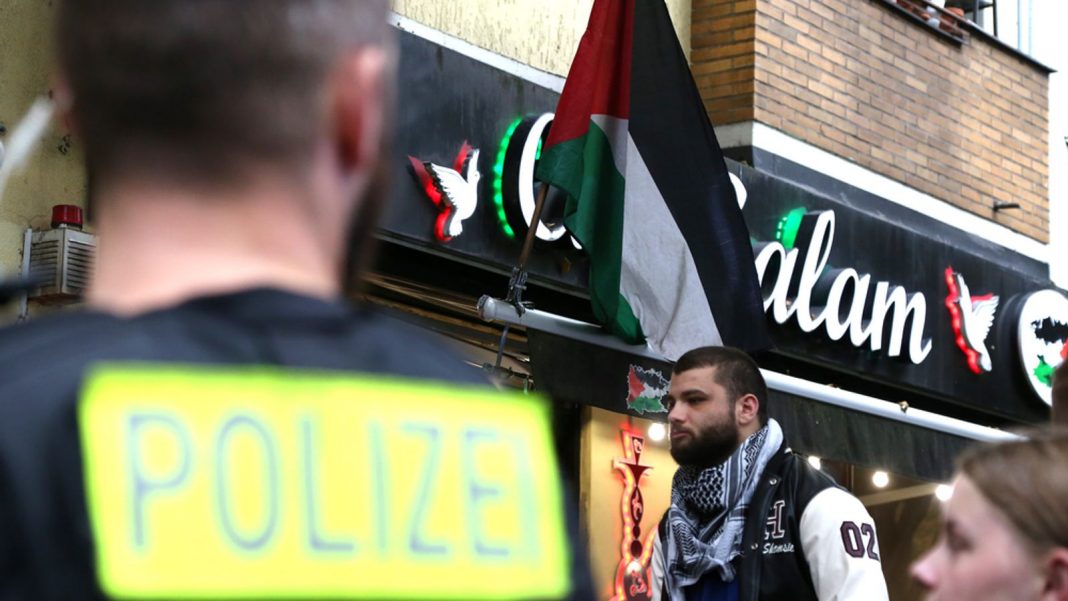“I’m terrified,” says Hope. “I’m just scared to leave my home.”
An Israeli living in Berlin for the past 20 years, her world changed in an instant following Hamas’s attack last Saturday.
She said she didn’t sleep for the following three days.
Follow the latest from the conflict as Israel begins its initial ground mission in Gaza
Desperate for updates, she was glued to Israeli news channels while trying to contact loved ones back home.
A week on, reports of rises in antisemitism in parts of Europe and calls by a former Hamas leader for a “Day of Rage” mean Hope is petrified to go out.
“Around the world, Jews and Israelis not being safe – this is something that I have never, ever dreamed of in my entire life,” she tells me.
Her terror is so great that she asked us not to publish her photo or real name for fear of being targeted.
She says she’s heard reports of neighbours leaving knives outside Israelis’ homes.
Although we can’t verify those reports, Hope’s fear isn’t unfounded.
Read more on this story:
Massive increase in antisemitism in London, police say
Why Israel is braced for Hezbollah attack from Lebanon
How negotiators will be working to free Hamas hostages
Please use Chrome browser for a more accessible video player
3:05
Gaza evacuations begin
Experts say there’s a pattern of increasing attacks on Jews following escalating violence in the Middle East.
“The risk is particularly high in Germany because antisemites of all political stripes are well-organised in Germany,” explains Aycan Demirel, an antisemitism prevention advisor.
In the hours following Hamas’s attack, Germany, along with France and the UK, quickly increased security around Jewish sites amid fear local communities would be targeted.
Extra police are visible outside the country’s biggest synagogue.
One of the private security officers standing outside tells us some parents are afraid to bring their children to the linked school in case it’s targeted by antisemitic terrorists.
It’s a fear the head of the Jewish Community of Berlin, Rabbi Yehuda Teichtal, has heard repeated by his congregation during the past week.
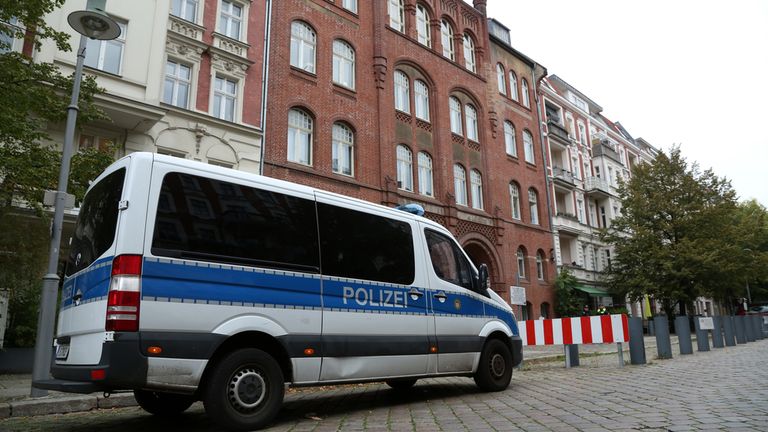
Police officers guard the Rykestrasse Synagogue. Pic: Adam Berry
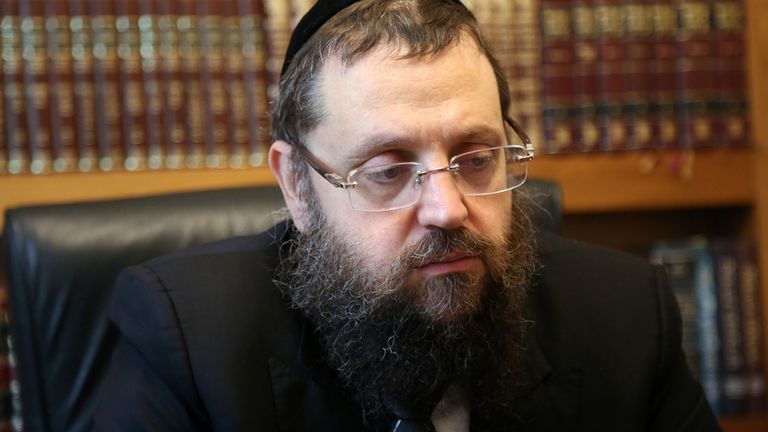
Rabbi Yehuda Teichtal. Pic: Adam Berry
“People are concerned and worried. [On Friday], there was a call for violence [against Jews], more students didn’t show up than showed up,” he says. “I personally believe that we should not change our lifestyle or what we are doing because that’s exactly what the terrorists want.”
Rabbi Teichtal estimates around 250,000 Jews live in Germany, with 50,000 of them based in Berlin.
He says many are traumatised by the unspeakable violence being reported.
One member of the community told him their grandmother saw a woman being raped and murdered in Israel’s kibbutz of Kfar Aza after Hamas’s unexpected assault from the Gaza Strip.
This content is provided by Spreaker, which may be using cookies and other technologies.
To show you this content, we need your permission to use cookies.
You can use the buttons below to amend your preferences to enable Spreaker cookies or to allow those cookies just once.
You can change your settings at any time via the Privacy Options.
Unfortunately we have been unable to verify if you have consented to Spreaker cookies.
To view this content you can use the button below to allow Spreaker cookies for this session only.
Click to subscribe to the Sky News Daily wherever you get your podcasts
Across Europe, leaders are rushing to try to prevent any spillover violence from the Israel-Hamas war.
France, which has Europe’s largest Muslim and Jewish populations, has banned all pro-Palestinian protests, using water cannon and tear gas to disperse those defying the order in Paris.
The government said more than 100 antisemitic acts and 2,000 reports had been recorded since Saturday.
In a televised address, President Macron urged the country to stay united, adding the “first duty” was to protect French Jews from attacks and discrimination.
In Amsterdam, three Jewish schools were closed on Friday due to security concerns.
In Spain and Portugal, members of the Jewish community were on high alert after two synagogues were vandalised with pro-Palestine graffiti.
Please use Chrome browser for a more accessible video player
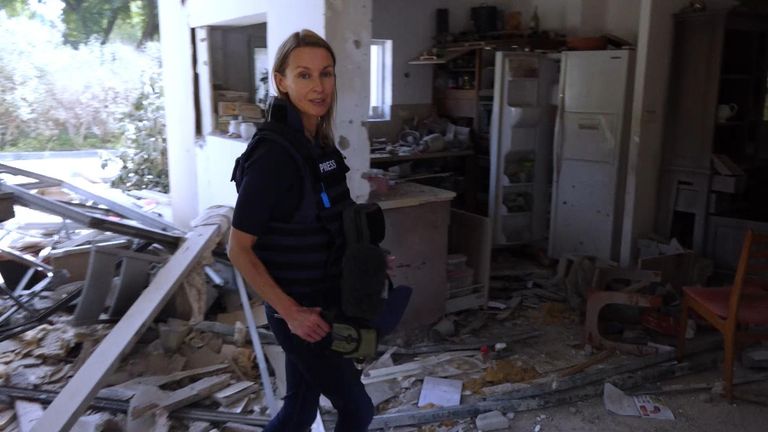
1:04
Inside family home that Hamas attacked
The German chancellor has vowed zero tolerance for antisemitism and banned all activities supporting Hamas’s attack, including using their symbols or burning the Israeli flag.
It follows a police report that hours after Hamas entered Israel, cakes and sweets were handed out at a pro-Palestinian demonstration in Berlin as some seemed to celebrate.
As a result, such rallies have been repeatedly cancelled in the city over public safety fears.
Small, spontaneous protests have sprung up on Sonnenallee, where many Palestinians live, only to be quickly shut down by police.
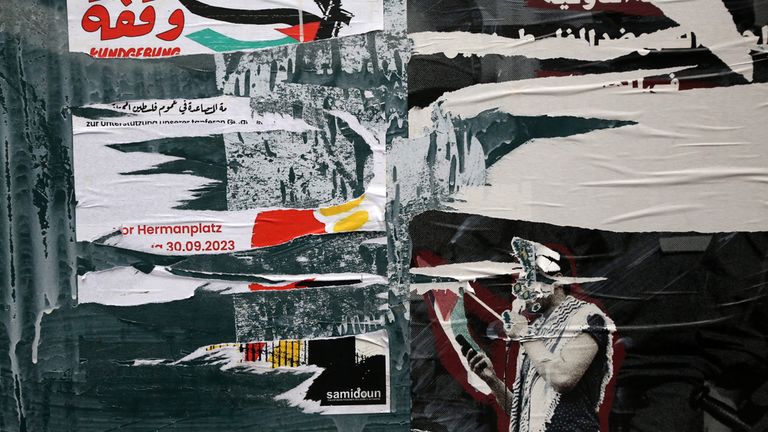
Pic: Adam Berry
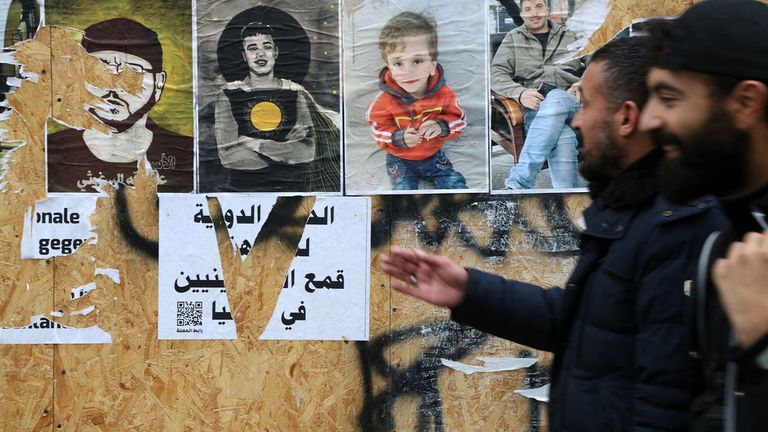
Pro-Palestinian posters destroyed after an effective ban on demonstrations. Pic: Adam Berry
Remnants of posters advertising the events hang from the walls where they’ve been ripped down.
“You can’t carry the Palestinian flag, if you do the police will take it away,” says local resident Mohammed.
He says he doesn’t want to show his face as he “doesn’t want problems with the police”.
“Everyone is really annoyed they’re not allowed to demonstrate,” he adds.
The national flag still flies above some of the streets’ cafes or is painted on to trees.
One man shows me his Palestine Liberation Organisation tattoo, but everyone here is reluctant to give interviews.
“It’s all dark, everything is black,” one resident tells me, describing how demoralised many of his neighbours feel.
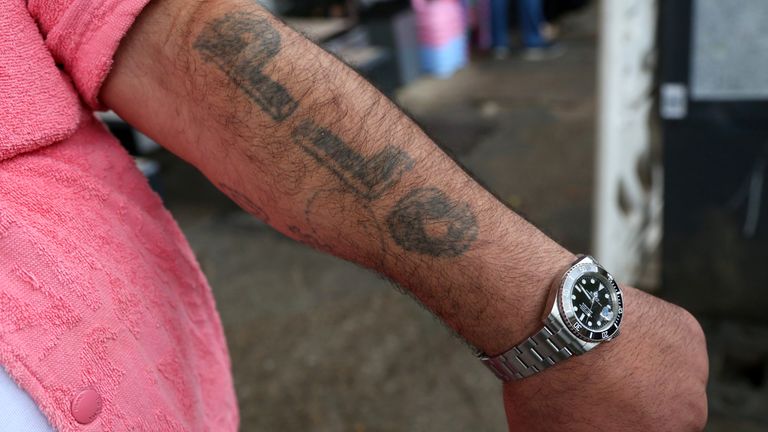
Pic: Adam Berry
“Hamas and Palestine have two different flags, but everything is treated as if it’s all Hamas even though one is a country and one is a party.”
He tells me he’s worried for his family stuck in Gaza amid heavy shelling.
“There are innocent people dying on both sides, but I tell people here not to talk to anyone. Anyone who opens their mouth is asking for trouble. They even shut down demonstrations that are for peace,” he says.
Minutes after we finish speaking, we see a large group of police on the street.
Between them are two German left-wing activists.
One is wearing a red and white Palestinian keffiyeh scarf, the other a necklace in the colours of the flag.
They tell us they were stopped on suspicion of handing out pro-Palestinian flyers, which they deny.
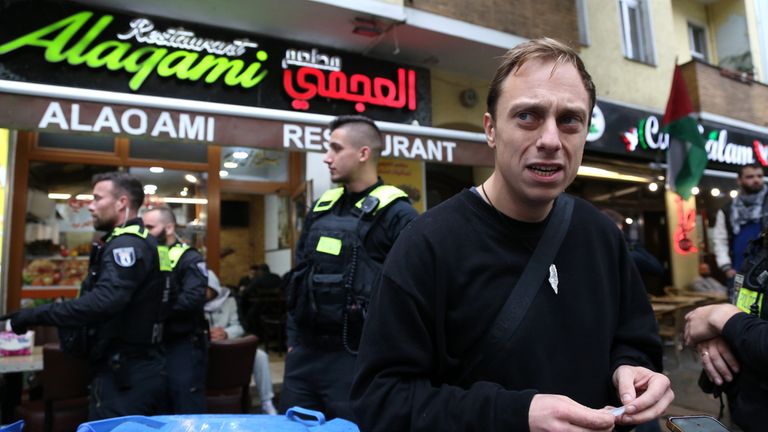
A leftist activist named Glenn waits to be released by police officers. Pic: Adam Berry
The man wearing the necklace says his name in Glenn and that he’s a member of Young Struggle, a socialist youth organisation.
He believes the blanket banning of all pro-Palestinian protests is “pure repression” and an attack on free speech.
While they may not agree with each other, his point raises another challenge for democratic governments in Europe.
“If we do not make a clear distinction between pro-Palestinian groups and groups supporting the antisemitic terroristic organisation Hamas, if we do not act against antisemitism and anti-Muslim racism, then this can lead to more hatred and the likelihood of further radicalisation will increase.
“In the long run this will lead to an even greater threat of radicalisation and violence,” explains Rüdiger Jose Hamm, co-managing director of the national committee on religiously motivated extremism.
Back in Berlin, the police finish their inquiries and move on, but there’s an uneasy feeling on the street; the sense the escalating conflict in the Middle East is already stoking fear and tension in communities in Europe.


